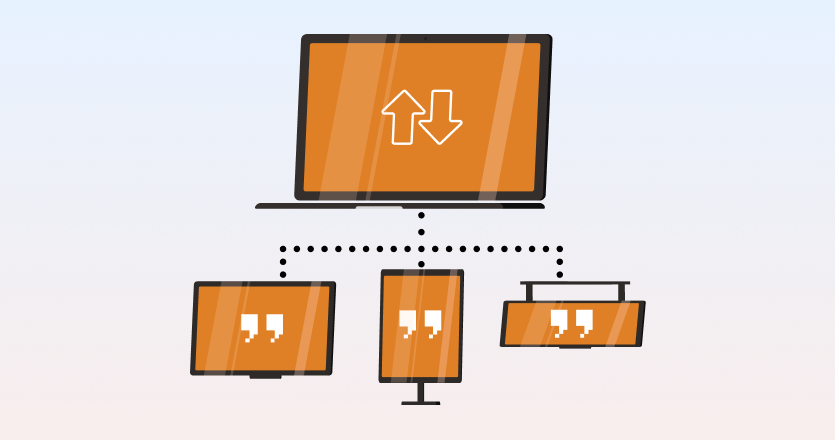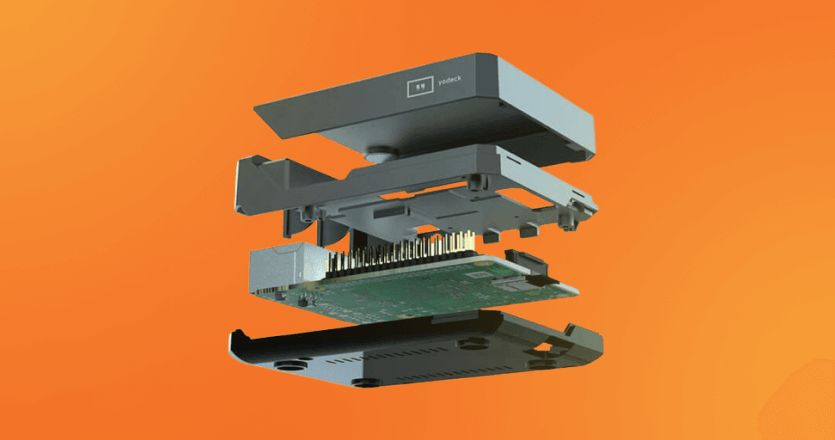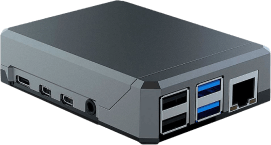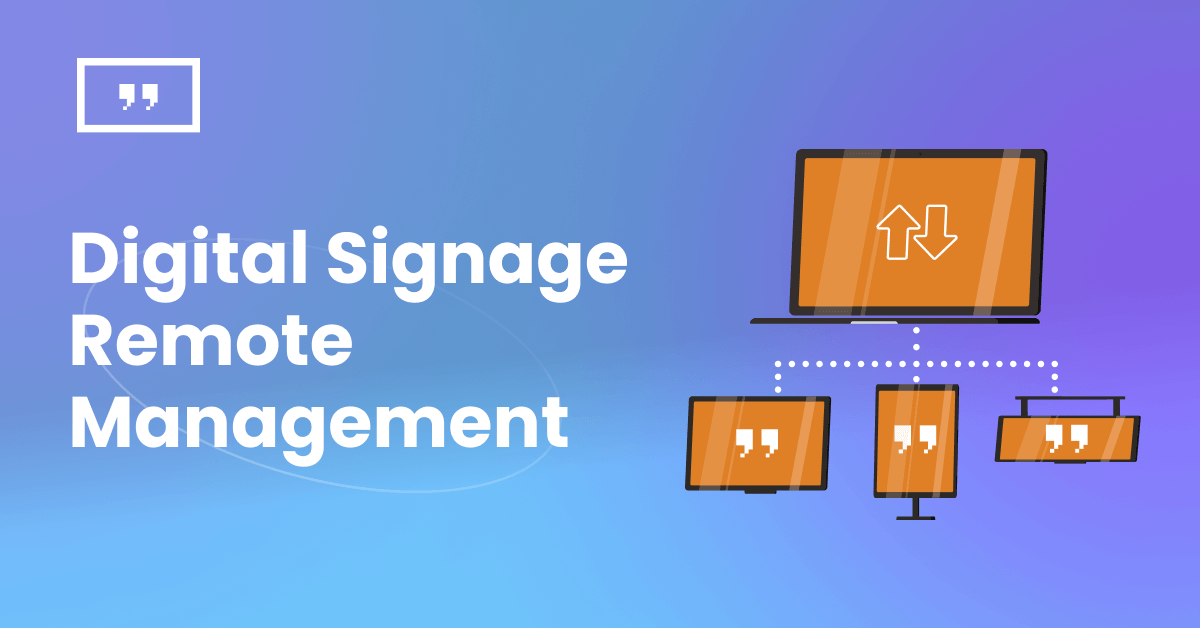Discover the benefits of Remote Device Management (RDM) for digital signage and why Yodeck’s Raspberry Pi-powered media player is the ideal choice for businesses of any size.
When it comes to creating effective digital signage, the technology that powers the screens is just as important as the content displayed. Behind every sleek digital signage display is a powerful system that needs to be reliable, secure, and easy to manage — especially when you’re dealing with multiple screens across various locations.
This is where the choice between managed and unmanaged devices becomes crucial. It’s not just about having a device that works; it’s about having a system that you can control, customize, and trust to perform flawlessly every time.
That’s why Yodeck has partnered with Raspberry Pi to create a digital signage player that is both powerful and affordable.
In this post, we’ll dive into the benefits of managed devices and remote management for digital signage, and why Raspberry Pi, paired with Yodeck’s software, is the ideal choice for businesses looking to maximize their digital signage impact.
Whether you’re new to digital signage or looking to optimize your existing setup, understanding these advantages will help you make the right choice for your business.
Understanding Remote Device Management (RDM) and Managed Devices
Remote Device Management (RDM) refers to the ability to monitor, manage, and control devices from a central location. In the context of digital signage, RDM allows you to oversee all your screens, players, and content remotely, without needing physical access to each device.
Managed devices are those that are configured to be controlled through RDM commands. Unlike unmanaged devices, which require on-site intervention for updates or troubleshooting, managed devices enable you to perform tasks like device monitoring, software updates, security patches, content changes and even rebooting and troubleshooting remotely.
This approach not only saves time and reduces costs but also enhances the reliability and security of your digital signage network.
The benefits of Remote Device Management and Managed Devices for digital signage
Managed devices, coupled with remote management through cloud-based digital signage software, offer a strategic advantage by providing control, security, and scalability that unmanaged devices simply can’t match.
Here are the key benefits of using managed devices and remote management for digital signage that can prove to be crucial to your success when scaling across multiple locations.

Control over OS and software updates
One of the primary advantages of using managed devices for digital signage is the control you have over the operating system (OS) and software updates.This ensures that updates are thoroughly tested and vetted before deployment, minimizing the risk of introducing bugs or vulnerabilities.
It also means that you can schedule updates during off-hours, ensuring that your digital signage remains operational when it matters most. This level of control is crucial for maintaining the stability and reliability of your signage network.
Consider a scenario with a consumer device like the Amazon Firestick, where updates are rolled out by the manufacturer leaving users scrambling to adapt. Unmanaged devices in digital signage can potentially cause unexpected downtime and disruptions at the worst times.
Enhanced security
Security is a top priority in digital signage, particularly when your displays are part of a broader network or accessible in public spaces.
Remote device management further strengthens security by enabling continuous monitoring of your signage network. This allows for quick detection and response to potential threats, ensuring that your digital signage remains secure and that your hardware is protected from unauthorized access or tampering.
Finally, unlike unmanaged devices, where you may be reliant on manufacturer schedules, managed devices enable you to implement timely security updates and patches to reduce vulnerability windows and mitigate threats.
Centralized management and monitoring
Another benefit of using managed devices for digital signage is the ability to manage and monitor your displays, players, and content from a central location. Whether you’re managing a few or hundreds of screens across multiple sites, centralized management simplifies the process, reducing the need for on-site intervention.
Remote management tools enable key functions such as device monitoring, scheduled or remote reboots, troubleshooting, and turning screens on/off using CEC (Consumer Electronics Control). You can also monitor crucial elements like HDMI connections (in case a cable has been disconnected), and take advantage of features like screenshot capture, which provides visual feedback for display monitoring.
Telemetry data such as storage status and device health checks also ensure you can avoid potential issues. A centralized approach saves time, minimizes downtime, and eliminates the need for on-site staff with technical expertise.
Customization and flexibility
Digital signage often needs to be tailored to specific environments and use cases, and managed devices excel in offering this level of customization. With managed devices, you can configure network settings, adjust display resolutions, and even install custom software to meet the unique needs of your signage.
This flexibility is crucial in scenarios where different locations may require different configurations. For instance, a certain use case might need high-resolution video playback, while another requires specific network settings for secure content delivery.
Managed devices allow you to customize each device according to its specific role, ensuring optimal performance across your entire network.
Scalability and future-proofing
Your digital signage needs will grow as quickly as your business does. Managed devices are inherently future-proof and scalable, allowing you to easily remove or deploy new media players to your digital signage network.
In addition, you can effortlessly adapt to new software updates, configure players and displays, edit content and integrate with additional systems to ensure that your investment remains valuable over time.
The effectiveness of remote device management (RDM) and managed devices doesn’t just depend on the software—it also hinges on the hardware you choose. That’s why Yodeck decided to make Raspberry Pi its media player of choice, also known as the Yodeck Player.
In the next section, we’ll explore why Raspberry Pi is the ideal choice for a digital signage player in a managed digital signage environment.
Why Raspberry Pi is Yodeck’s media player of choice
To fully capitalize on the benefits of managed devices and remote device management (RDM) in digital signage, selecting the right hardware is crucial.
Yodeck has made a strategic choice in selecting Raspberry Pi as its default media player —known as the Yodeck Player— because it perfectly aligns with the demands of modern digital signage.
Whether you’re managing simple digital posters or interactive kiosks with complex functionality, Raspberry Pi can handle the task.

Let’s dive into why Raspberry Pi is the ideal choice for a managed digital signage environment, especially when paired with Yodeck’s platform.
Reliability & longevity
Manufactured in the UK, Raspberry Pi is known for its extensive end-of-life (EOL) and long-term reliability. The earliest models (even the first Rasberry Pi) are still being produced and supported, ensuring that your hardware investment remains valuable over time.
This long product lifecycle is particularly beneficial for businesses looking for a durable and reliable digital signage solution that won’t require frequent replacements.
Optimized hardware for efficient operation
Raspberry Pi’s hardware is optimized for efficient operation, capable of handling high-definition video playback and complex content. Its compact form factor makes it easy to integrate into various setups, whether you’re installing it behind a display or within a kiosk.
Additionally, the Raspberry Pi has no moving parts, meaning it operates silently and with less risk of mechanical failure, further enhancing the reliability of your digital signage setup.
This is crucial for maintaining a high-quality user experience, particularly in environments where consistent, uninterrupted playback is essential.
Paired with Yodeck’s digital signage software, Raspberry Pi transforms into a powerful tool for delivering flawless digital signage experiences.
Built-In security features
Security is a top priority in digital signage, especially when devices are part of a larger network. Raspberry Pi comes equipped with several hardware security features, including secure boot and encrypted data storage, which help protect your content and system configurations from unauthorized access.
In addition, Yodeck’s platform integrates seamlessly with Raspberry Pi’s security features, providing comprehensive protection for your digital signage network. Through Yodeck, you can remotely monitor and manage the security status of all your Raspberry Pi devices, ensuring they are always up to date with the latest security patches.
Cost-effective performance
Compared to alternatives, Raspberry Pi offers the best performance-to-cost and reliability-to-cost ratio, making it the most affordable choice for digital signage. Its adaptability across various digital signage scenarios further enhances its cost-effectiveness, as businesses can deploy the same hardware for different use cases, reducing the need for multiple types of devices.
Yodeck’s software is designed to leverage Raspberry Pi’s capabilities, ensuring smooth playback and efficient content management without breaking the bank.
And the Yodeck Player delivers reliable functionality at only a fraction of the cost of other media players. Plus, if you sign up for any annual plan, you get Yodeck players completely for free!

Get Players for FREE
That’s right! Select any Annual Plan and we will give you all the players you need for your monitors, preconfigured and for free. Just plug them in and you’re good to go!
Enhanced connectivity
Raspberry Pi’s General-Purpose Input/Output (GPIO) pins allow for the integration of a wide range of peripherals or bits and bobs like keyboards, screens, cameras, sensors, motors, buttons or other add-on HATs. The GPIO pins open a world of possibilities for imaginative digital signage use cases. This adaptability makes Raspberry Pi an excellent choice for a variety of digital signage applications, from simple displays to highly interactive setups.
Additionally, Raspberry Pi supports Consumer Electronics Control (CEC), allowing you to turn monitors on or off remotely. To make things even easier, you can schedule the on/off hours of specific screens through Yodeck’s portal for automated power management and reduced maintenance costs. Raspberry Pi also provides an Ethernet port, ensuring a stable and reliable wired network connection for your digital signage, which is crucial for consistent performance in networked environments.
Extensive customization & configuration
Raspberry Pi’s ability to be extensively customized is one of its key strengths. Whether adjusting network settings and parameters, fine-tuning display resolutions, or installing custom drivers and security certificates, Raspberry Pi allows for detailed configurations tailored to specific digital signage needs.
This level of customization is essential for optimizing performance in diverse environments.
Yodeck simplifies this configuration process by providing an intuitive interface that makes complex setups easy to manage. From a centralized dashboard, you can not only manage network settings, push custom scripts, and install device drivers but also monitor and report hardware status and statistics, ensuring your digital signage network is always performing optimally.
Quick deployment and availability
Raspberry Pi’s widespread availability and quick delivery make it a perfect choice for businesses needing to rapidly deploy and scale their digital signage networks.
In regions like the US and EU, Raspberry Pi devices can be delivered within a few days without going through customs. This quick availability is crucial for swift digital signage deployments with tight timelines that can’t afford logistical delays.
Moreover, the RPi is the exact same device all over the world. This means you won’t have to deal with low-quality clones or issues like firmware inconsistencies, or chipset problems.
OS & hardware compatibility
Raspberry Pi’s compatibility with Yodeck’s OS is a significant advantage in digital signage. Even the oldest Raspberry Pi models can run the latest version of Yodeck’s OS, preventing hardware obsolescence and extending device lifecycles.
While newer OS versions might challenge older hardware, Yodeck’s OS allows these devices to remain effective for the most common tasks.
Additionally, Yodeck’s platform supports extensive OS customization, enabling the installation of specific drivers and scripts to tailor the system to your needs. With Raspberry Pi’s long product lifecycle, Yodeck ensures consistent, reliable support, making it a sustainable choice for your digital signage network.
High-quality components for enhanced reliability
Finally, Yodeck enhances the reliability of your digital signage setup by pairing Raspberry Pi with premium components, including durable enclosures, reliable SD cards, premium HDMI cables, and robust power supply units.
These high-quality components contribute to the overall durability and performance of your digital signage, minimizing the risk of hardware failures and ensuring consistent operation.
Yodeck & RPi: Taking digital signage to the next level
Yodeck, combined with the reliable Raspberry Pi, offers a powerful and cost-effective digital signage solution.
With advanced scheduling features, hundreds of free digital signage apps and templates, and remote management capabilities, Yodeck allows you to set up your first digital signage screen in minutes.
Sign up today and start your free trial. Plus, with any annual plan, you’ll get Yodeck players at no additional cost!
